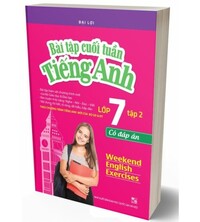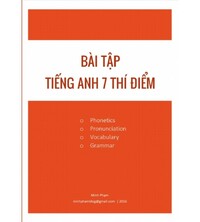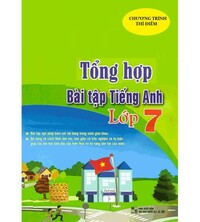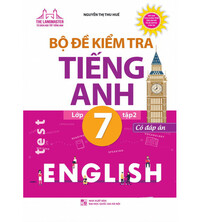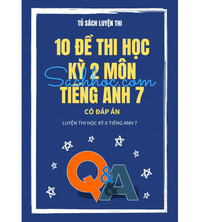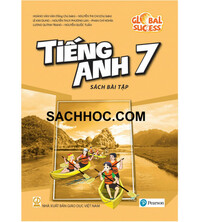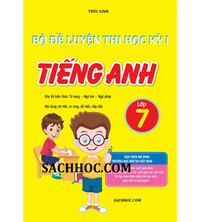Đề thi kì 2 môn tiếng Anh lớp 7 năm 2020 - 2021 Trường THCS Thăng Long
Đề thi học kỳ 2 tiếng Anh 7 trường THCS Thăng Long (2020-2021) có lời giải chi tiết.
Đề bài
THANG LONG SECONDARY SCHOOL FINAL ENGLISH TEST OF THE SECOND SEMESTER
GRADE 7 (SCHOOL YEAR 2020-2021)
Time allowance: 60 minutes
|
Học sinh làm bài vào phiếu trả lời trắc nghiệm (phần tự luận làm mặt sau phiếu).
PART 1: LANGUAGE FOCUS
Mark the letter A, B, C or D on your answer sheet to indicate the word that differs from the other three in the position of primary stress in each of the following questions.
1. A. cannon B. greasy C. direct D. poster
2. A. renewable B. dangerous C. poverty D. plentiful
Mark the letter A, B, C or D on your answer sheet to indicate the word whose underlined part differs from the other three in pronunciation in each of the following questions.
3. A. hilarious B. vehicle C. hydro D. harvest
4. A. performed B. starred C. recycled D. parked
Mark the letter A, B, C or D on your answer sheet to indicate the correct answer to each of the following questions.
5. You should look right and left when you go__________the road.
A. along B. up C. down D. across
6. Public_________in this city is quite good, and it's not expensive.
A. journey B. transport C. vehicles D. travel
7. __________should walk across the street at the zebra crossing.
A. Drivers B. Pedestrians C. Cyclists D. Motorists
8. People often laugh a lot when they see __________film.
A. comedy B. science fiction C. horror D. documentary
9. The film didn't receive good reviews from critics._________, many people went to see it.
A. However B. Nevertheless C. Although D. A&B are correct
10. Rock in Rio and the Cannes film Festival are__________festivals.
A. religious B. seasonal C. music and art D. superstitious
11. There is a special_______for Japanese girls on March 3rd every year.
A. celebrate B. celebration C. celebratory D. celebrating
12. _________do people celebrate the festival? - They celebrate it in a special way.
A. How often B. What C. Why D. How
13. Non-renewable energy sources like coal, natural gas and_________produce a lot of carbon dioxide.
A. wind B. hydro C. oil D. solar
14. Carbon footprint is about the__________effect we have on the environment.
A. positive B. advantage C. harm D. negative
15 At this time next week, my dad__________ new glass in the windows to stop heat escaping.
A. will be installing B. is installed C. was installed D. will be installed
16. ___________driving will cause accidents on the road.
A. Caring B. Careful C. Careless D. Harmless
17. I usually read books about technology while I am___________a train.
A. in B. on C. by D. with
18. We will go on holiday with some friends of_____________.
A. ours B. our C. us D. we
19. __________we____________high speed trains in the next five years?
A. Do / have B. Will / to have C. Will / have D. Did / have
Mark the letter A, B, C or D on your answer sheet to indicate the option that best completes each of the following exchanges.
20. - Shall we go to the "Travelling in the future" exhibition? - ________________
A. Great idea! Let's go. B. Not really.
C. Not too bad. And you? D. See you then.
21. - What's on the television tonight? -_________________
A. I will go to the cinema. B. At half past nine.
C. The film is good. D. A football match after the news.
Mark the letter A, B, C or D on your answer sheer to indicate the underlined part that needs correction in each of the following questions.
22. Although careful preparation, they had a lot of difficulties in making the film.
A. Although B. preparation C. had D. difficulties
23. At this time tomorrow, the students do maths exam in my school.
A. this time B. the C. do D. in
24. Hoi Mua festival is held for thank the Rice God for the crops and to pray for better crops in the future.
A. is B. for C. the Rice God D. crops
25. The characters in the book were so convinced that I was shocked when one of them died.
A. The characters B. convinced C. shocked D. them
PART 2: READING
Read the following passage, then mark the letter A, B, C or D on your answer sheet to indicate the correct word or phrase that best fits each of the numbered blanks.
Most of the energy we use today (26)_______ from coal, oil and gas. But these will not last for ever, and burning them is slowly harming the (27)__________. We need to look for other ways of supplying energy. Solar power is a way of using the (28)_______ energy as heat or sunlight to make electricity. We can also use wind-power by building modern windmills that spin in the wind. There are several types of water-power: river water in mountainous areas can (29)_______ to generate hydroelectric power, and we can also create electricity from sea water flowing in and out with the (30)_______ .
26. Most of the energy we use today (26)_______ from coal, oil and gas.
A. makes B. creates C. comes D. begins
27. But these will not last for ever, and burning them is slowly harming the (27)__________.
A. soil B. atmosphere C. water D. resources
28. Solar power is a way of using the (28)_______ energy as heat or sunlight to make electricity.
A. Sun's B. Moon's C. Star's D. Earth's
29. There are several types of water-power: river water in mountainous areas can (29)_______ to generate hydroelectric power,…
A. use B. using C. be used D. to use
30. …and we can also create electricity from sea water flowing in and out with the (30)_______ .
A. crests B. ways C. waves D. tides
Read the following passage, then mark the letter A or B on your answer sheet to indicate the correct answer to each of the following questions.
I'll never forget my visit to Hong Kong. When I arrived, everybody was very busy with the preparations involved. The atmosphere was fantastic. There were bright colours and delicious smells everywhere. The local people were cleaning every comer of their houses and decorating the walls with red pieces of paper.
Another custom is to cook fish on New Year's Eve and eat it the next day. My friend told me that they wanted to have something to eat on the first day of the year.
I was really looking forward to New Year's Eve Dinner. The whole family got together and everyone was really happy. I noticed that the grandparents and parents gave children red envelopes with money inside. After dinner they all started playing cards for good luck. Nobody went to sleep before midnight. At midnight the great event begins: fireworks! I was really amazed. All around the city I could see and hear colourful fireworks. It was incredible and I was really excited.
31. The local people decorated the corn their houses with red pieces of paper.
A. True B. False
32. People cooked fish to eat on New Year’s Eve.
A. True B. False
33. The parents and grandparents gave their children red envelopes with money inside.
A. True B. False
34. People didn't go to bed before midnight.
A. True B. False
35. The card games began at midnight.
A. True B. False
PART 3: LISTENING
Listen to the passage and mark the letter A or B on your answer sheet to indicate the correct answer to each of the following questions.
36. Non-renewable sources are being used up.
A. True B. False
37. Many poor people in developing countries have little electricity
A. True B. False
38. Biogas is a new source of energy available for poor people.
A. True B. False
39. Biogas creates a lot of smoke.
A. True B. False
40. The new energy source is not costly.
A. True B. False
PART 4: WRITING
Finish the second sentence so that it has a similar meaning to the first one, using the word in brackets or beginning with the given words.
41. My father was an actor many years ago, but now he is a director. (USED)
=>...........................................................................................
42. They were shocked at the ending of the film. (SHOCKING)
=>...........................................................................................
43. Although Carnival is a popular festival in many countries in South America, I have never attended it. (NEVERTHELESS)
=>...........................................................................................
44. They built a hydro power station in the North of the country last year.
=> A hydro power station..................................................... .
45. We will solve the problem of energy shortage by using solar energy next decade.
=> The problem of energy shortage....................................... .
Lời giải chi tiết
|
1. C |
2. A |
3. B |
4. D |
5. D |
|
6. B |
7. B |
8. A |
9. D |
10. C |
|
11. B |
12. D |
13. C |
14. D |
15. A |
|
16. C |
17. B |
18. A |
19. C |
20. A |
|
21. D |
22. A |
23. C |
24. B |
25. B |
|
26. C |
27. B |
28. A |
29. C |
30. C |
|
31. A |
32. B |
33. A |
34. A |
35. B |
41. My father used to be an actor.
42. The ending of the film was shocking.
43. Carnival is a popular festival in many countries in South America. Nevertheless, I have never attended it.
44. was built in the North of the country last year
45. will be solved by using solar energy next decade
HƯỚNG DẪN GIẢI CHI TIẾT
1. C
Kiến thức: Trọng âm từ có 2 âm tiết
Giải chi tiết:
cannon /ˈkænən/
greasy /ˈɡriːsi/
direct /daɪˈrekt/
poster /ˈpəʊstə(r)/
Phương án C có trọng âm 2, các phương án còn lại có trọng âm 1.
Đáp án: C
2. A
Kiến thức: Trọng âm từ có 3 âm tiết
Giải chi tiết:
renewable /rɪˈnjuːəbl/
dangerous /ˈdeɪndʒərəs/
poverty /ˈpɒvəti/
plentiful /ˈplentɪfl/
Phương án A có trọng âm 2, các phương án còn lại có trọng âm 1.
Đáp án: A
3. B
Kiến thức: Cách phát âm [h]
Giải chi tiết:
hilarious /hɪˈleəriəs/
vehicle /ˈviːəkl/
hydro /ˈhaɪdrəʊ/
harvest /ˈhɑːvɪst/
Phần được gạch chân ở phương án B không được phát âm (âm câm), các phương án còn lại được phát âm /h/.
Đáp án: B
4. D
Kiến thức: Cách phát âm đuôi -ed
Giải chi tiết:
Đuôi –ed được phát âm là:
- /ɪd/ khi động từ có âm tận cùng là /t/, /d/.
- /t/ khi động từ có tận cùng là /ʃ/, /tʃ/, /s/, /p/, /f/, /k/.
- /d/ khi động từ có tận cùng là các nguyên âm và phụ âm còn lại.
performed /pəˈfɔːmd/
starred /stɑːd/
recycled /ˌriːˈsaɪkld/
parked /pɑːkt/
Phần được gạch chân ở phương án D được phát âm là /t/, các phương án còn lại được phát âm /d/.
Đáp án: D
5. D
Kiến thức: Từ vựng – giới từ
Giải chi tiết:
go along: đi dọc theo
go up: đi lên, tăng
go down: đi xuống, giảm
go across: đi băng qua
You should look right and left when you go across the road.
Tạm dịch: Bạn nên nhìn trái và phải khi bạn đi sang đường.
Đáp án: D
6. B
Kiến thức: Từ vựng
Giải chi tiết:
journey (n): hành trình
transport (n): sự vận chuyển
vehicles (n): xe cộ
travel (n): sự đi lại
=> public transport: giao thông công cộng
Public transport in this city is quite good, and it's not expensive.
Tạm dịch: Phương tiện giao thông công cộng ở thành phố này khá tốt, và không đắt tiền.
Đáp án: B
7. B
Kiến thức: Từ vựng
Giải chi tiết:
drivers (n): tài xế
pedestrians (n): người đi bộ
cyclists (n): người đi xe đạp
motorists (n): người đi xe máy
Pedestrians should walk across the street at the zebra crossing.
Tạm dịch: Người đi bộ nên băng qua đường ở vạch kẻ đường dành cho người đi bộ.
Đáp án: B
8. A
Kiến thức: Từ vựng
Giải chi tiết:
comedy (n): hài kịch
science fiction (n): khoa học giả tưởng
horror (n): kinh dị
documentary (n): phim tài liệu
People often laugh a lot when they see comedy film.
Tạm dịch: Mọi người thường cười nhiều khi họ xem phim hài.
Đáp án: A
9. D
Kiến thức: Liên từ
Giải chi tiết:
However: tuy nhiên; phía sau “however” có dấu phẩy
Nevertheless: dù vậy; phía sau “however” có dấu phẩy
Although: mặc dù
The film didn't receive good reviews from critics. However / Nevertheless, many people went to see it.
Tạm dịch: Phim không nhận được đánh giá tốt từ các nhà phê bình. Dù vậy, nhiều người đi xem nó.
Đáp án: D
10. C
Kiến thức: Từ vựng
Giải chi tiết:
religious (a): thuộc về tôn giáo
seasonal (a): theo mùa
music and art: âm nhạc và nghệ thuật
supersitious (a): mê tín
Rock in Rio and the Cannes film Festival are music and art festivals.
Tạm dịch: Rock ở Rio và Liên hoan phim Cannes là lễ hội âm nhạc và nghệ thuật.
Đáp án: C
11. B
Kiến thức: Từ vựng – từ loại
Giải chi tiết:
Sau mạo từ “a” và tính từ “special” cần một danh từ số ít.
celebrate (v): tổ chức kỉ niệm
celebration (n): sự tổ chức, sự kỷ niệm
celebratory (a): kỷ niệm
celebrating (V-ing)
There is a special celebration for Japanese girls on March 3rd every year.
Tạm dịch: Có lễ kỷ niệm đặc biệt cho các cô gái Nhật Bản vào ngày 3 tháng Ba hàng năm.
Đáp án: B
12. D
Kiến thức: Wh-words
Giải chi tiết:
How often: bao lâu một lần => hỏi về tần suất
What: cái gì => hỏi về sự vật, sự việc
Why: tại sao => hỏi lý do
How: như thế nào => hỏi về cách thức, tính chất
How do people celebrate the festival? - They celebrate it in a special way.
Tạm dịch: Mọi người tổ chức lễ hội này như thế nào? – Họ tổ chức theo cách rất đặc biệt.
Đáp án: D
13. C
Kiến thức: Từ vựng
Giải chi tiết:
wind (n): gió
hydro (n): khí hi-rô
oil (n): dầu
solar (a): thuộc về mặt trời
Non-renewable energy sources like coal, natural gas and oil produce a lot of carbon dioxide.
Tạm dịch: Các nguồn năng lượng không thể tái tạo như than đá, khí đốt tự nhiên và dầu mỏ tạo ra rất nhiều CO2.
Đáp án: C
14. D
Kiến thức: Từ vựng
Giải chi tiết:
positive (a): tích cực
advantage (n): lợi thế
harm (n,v): làm hại, tác hại
negative (a): tiêu cực
Carbon footprint is about the negative effect we have on the environment.
Tạm dịch: Khí thải cac-bon nói về ảnh hưởng tiêu cực chúng ta gây ra cho môi trường.
Đáp án: D
15. A
Kiến thức: Thì tương lai tiếp diễn
Giải chi tiết:
Dấu hiệu nhận biết thì tương lai tiếp diễn: at this time next week (lúc này tuần tới)
Cấu trúc thì tương lai tiếp diễn: S + will be V-ing
At this time next week, my dad will be installing new glass in the windows to stop heat escaping.
Tạm dịch: Vào thời điểm này vào tuần tới, bố tôi sẽ lắp kính mới ở cửa sổ để ngăn nhiệt thoát ra ngoài.
Đáp án: A
16. C
Kiến thức: Từ vựng
Giải chi tiết:
caring (a): quan tâm
careful (a): cẩn thận
careless (a): bất cẩn
harmless (a): vô hại
Careless driving will cause accidents on the road.
Tạm dịch: Lái xe bất cẩn sẽ gây ra tai nạn trên đường.
Đáp án: C
17. B
Kiến thức: Từ vựng
Giải chi tiết:
Ta có cụm từ: on a train (đi tàu hỏa)
I usually read books about technology while I am on a train.
Tạm dịch: Tôi thường đọc sách công nghệ khi đang đi tàu hỏa.
Đáp án: B
18. A
Kiến thức: Đại từ nhân xưng
Giải chi tiết:
Sau giới từ “of” cần một đại từ sở hữu đóng vai trò như một danh từ.
ours (đại từ sở hữu): của chúng tôi
our + N (tính từ sở hữu): của chúng tôi
us (tân ngữ): chúng tôi
we (chủ ngữ): chúng tôi
We will go on holiday with some friends of ours.
Tạm dịch: Chúng tôi sẽ đi nghỉ mát với bạn của chúng tôi.
Đáp án: A
19. C
Kiến thức: Thì tương lai đơn
Giải chi tiết:
Dấu hiệu nhận biết thì tương lai đơn: in the next five years (trong 5 năm nữa)
Cấu trúc thì tương lai đơn dạng câu hỏi: Will + S + V(nguyên thể)?
Will we have high speed trains in the next five years?
Tạm dịch: Trong 5 năm nữa chúng ta sẽ có tàu hỏa tốc cao không?
Đáp án: C
20. A
Kiến thức: Ngôn ngữ giao tiếp
Giải chi tiết:
A. Ý kiến hay đó! Chúng ta đi thôi.
B. Không hẳn.
C. Không tệ lắm. Còn bạn thì sao?
D. Gặp bạn sau nhé.
- Shall we go to the "Travelling in the future" exhibition? - Great idea! Let's go.
Tạm dịch: Chúng ta đi xem triễn lãm “Phương tiện đi lại trong tương lai” nhé? – Ý kiến hay đó! Chúng ta đi thôi.
Đáp án: A
21. D
Kiến thức: Ngôn ngữ giao tiếp
Giải chi tiết:
A. Tôi sẽ đi xem phim.
B. Lúc 9h30.
C. Phim này hay đó.
D. Một trận bóng đá sau chương trình thời sự.
- What's on the television tonight? - A football match after the news.
Tạm dịch: Có gì trên tivi tối nay? – Một trận bóng đá sau chương trình thời sự.
Đáp án: D
22. A
Kiến thức: Mệnh đề nhượng bộ “Although/ Despite”
Giải chi tiết:
Ta có:
Although + S + V = Despite/ In spite of + N/V-ing: mặc dù
careful preparation (n.phr): sự chuẩn bị cẩn thận => dùng “despite/ in spite of”
Despite/ In spite of careful preparation, they had a lot of difficulties in making the film.
Tạm dịch: Mặc dù chuẩn bị cẩn thận, họ gặp nhiều khó khăn khi làm phim này.
Đáp án: A
23. C
Kiến thức: Thì tương lai tiếp diễn
Giải chi tiết:
Dấu hiệu nhận biết thì tương lai tiếp diễn: at this time tomorrow (lúc này ngày mai)
Cấu trúc thì tương lai tiếp diễn: S + will be V-ing
At this time tomorrow, the students will be doing maths exam in my school.
Tạm dịch: Vào lúc này ngày mai, học sinh sẽ đang làm bài thi trong trường.
Đáp án: C
24. B
Kiến thức: Dạng của động từ “to V”
Giải chi tiết:
Ta có quy tắc: S + be Ved/V3 (cấu trúc bị động) + to V(nguyên thể)
Sau liên từ “and” là “to pray” nên trước “and” cũng phải là một “to V”.
Hoi Mua festival is held to thank the Rice God for the crops and to pray for better crops in the future.
Tạm dịch: Lễ Hội Mùa được tổ chức để cảm tạ Thần Lúa đã chọ vụ mùa và để cầu nguyện cho các vụ mùa bội thu hơn trong tương lai.
Đáp án: B
25. B
Kiến thức: Từ vựng – tính từ
Giải chi tiết:
Phân biệt 2 loại tính từ:
- Tính từ chủ động (V-ing): để mô tả tính chất/ đặc điểm của người/ sự vật.
- Tính từ bị động (V-ed): mô tả cảm xúc của con người do bị tác động mà có
convinced (V-ed): bị thuyết phục => tính từ bị động
convincing (V-ing): có tính thuyết phục => tính từ chủ động
The characters in the book were so convincing that I was shocked when one of them died.
Tạm dịch: Các nhân vật trong quyển sách này quá thuyết phục đến nỗi tôi bị sốc khi một trong số họ chết.
Đáp án: B
26. C
Kiến thức: Từ vựng
Giải chi tiết:
make (v): làm nên, tạo nên
create (v): tạo ra
come from (v): đến
begin (v): bắt đầu
=> come from: có nguồn gốc từ
Most of the energy we use today (26) comes from coal, oil and gas.
Tạm dịch: Hầu hết năng lượng mà chúng ta sử dụng ngày nay có nguồn gốc từ than đá, dầu mỏ và khí đốt.
Đáp án: C
27. B
Kiến thức: Từ vựng
Giải chi tiết:
soil (n): đất
atmosphere (n): bầu không khí/ khí quyển
water (n): nước
resources (n): nguồn
But these will not last forever, and burning them is slowly harming the (27) atmosphere.
Tạm dịch: Nhưng chúng sẽ không tồn tại mãi, và việc đốt cháy chúng đang dần làm hại bầu khí quyển.
Đáp án: B
28. A
Kiến thức: Từ vựng
Giải chi tiết:
Sun’s: của mặt trời
Moon’s: của mặt trăng
Star’s: của ngôi sao
Earth’s: của Trái Đất
Solar power is a way of using the (28) Sun’s energy as heat or sunlight to make electricity.
Tạm dịch: Năng lượng mặt trời là phương thức sử dụng năng lượng của mặt trời như nhiệt hay ánh sáng mặt trời để tạo ra nẵng lượng
Đáp án: A
29. C
Kiến thức: Câu bị động với động từ khuyết thiếu “can”
Giải chi tiết:
Ta có cấu trúc bị động với “can”: S + can be Ved/PP => can be used (có thể được sử dụng)
There are several types of water-power: river water in mountainous areas can (29) be used to generate hydroelectric power,…
Tạm dịch: Có một số loại năng lượng nước: nước sông ở các vùng núi có thể được sử dụng để tạo ra thủy điện,..
Đáp án: C
30. C
Kiến thức: Từ vựng
Giải chi tiết:
crests (n): ngọn sóng
ways (n): cách thức
waves (n): sóng
tides (n): thủy triều
and we can also create electricity from sea water flowing in and out with the (30) waves.
Tạm dịch: …và chúng ta cũng có thể tạo ra điện từ nước biển chảy từ trong ra ngoài với các con sóng.
Đáp án: C
Bài đọc hoàn chỉnh:
Most of the energy we use today (26) comes from coal, oil and gas. But these will not last for ever, and burning them is slowly harming the (27) atmosphere. We need to look for other ways of supplying energy. Solar power is a way of using the (28) Sun’s energy as heat or sunlight to make electricity. We can also use wind-power by building modern windmills that spin in the wind. There are several types of water-power: river water in mountainous areas can (29) be used to generate hydroelectric power, and we can also create electricity from sea water flowing in and out with the (30) waves.
Tạm dịch bài đọc:
Hầu hết năng lượng chúng ta sử dụng ngày nay đến từ than đá, dầu mỏ và khí đốt. Nhưng những thứ này sẽ không tồn tại mãi mãi, và việc đốt chúng đang dần gây hại cho bầu khí quyển. Chúng ta cần tìm kiếm những cách khác để cung cấp năng lượng. Năng lượng mặt trời là một cách sử dụng năng lượng của Mặt trời dưới dạng nhiệt hoặc ánh sáng mặt trời để tạo ra điện. Chúng ta cũng có thể sử dụng năng lượng gió bằng cách xây dựng các cối xay gió hiện đại quay trong gió. Có một số loại năng lượng nước: nước sông ở miền núi có thể được sử dụng để tạo ra thủy điện, và chúng ta cũng có thể tạo ra điện từ nước biển chảy vào và ra với những con sóng.
31. A
Kiến thức: Đọc hiểu thông tin chi tiết
Giải chi tiết:
The local people decorated the corn their houses with red pieces of paper.
(Người dân địa phương trang trí ngôi nhà của họ bằng những mảnh giấy đỏ.)
Thông tin từ bài đọc: The local people were cleaning every comer of their houses and decorating the walls with red pieces of paper.
Tạm dịch: Người dân địa phương đang dọn dẹp nhà của họ và trang trí những bức tường bằng những mảnh giấy đỏ.
Đáp án: A
32. B
Kiến thức: Đọc hiểu thông tin chi tiết
Giải chi tiết:
People cooked fish to eat on New Year’s Eve.
(Mọi người nấu cá để ăn vào đêm giao thừa.)
Thông tin từ bài đọc: Another custom is to cook fish on New Year's Eve and eat it the next day.
Tạm dịch: Một phong tục khác là nấu cá vào đêm giao thừa và ăn vào ngày hôm sau.
Đáp án: B
33. A
Kiến thức: Đọc hiểu thông tin chi tiết
Giải chi tiết:
The parents and grandparents gave their children red envelopes with money inside.
(Bố mẹ và ông bà cho con cháu những phong bì đỏ với tiền bên trong.)
Thông tin từ bài đọc: I noticed that the grandparents and parents gave children red envelopes with money inside.
Tạm dịch: Tôi để ý thấy ông bà, cha mẹ cho trẻ con những phong bì đỏ với tiền bên trong.
Đáp án: A
34. A
Kiến thức: Đọc hiểu thông tin chi tiết
Giải chi tiết:
People didn't go to bed before midnight.
(Mọi người không đi ngủ trước nửa đêm.)
Thông tin từ bài đọc: Nobody went to sleep before midnight.
Tạm dịch: Không ai đi ngủ trước nửa đêm.
Đáp án: A
35. B
Kiến thức: Đọc hiểu thông tin chi tiết
Giải chi tiết:
The card games began at midnight.
(Trò chơi bài bắt đầu lúc nửa đêm.)
Thông tin từ bài đọc: After dinner they all started playing cards for good luck.
Tạm dịch: Sau bữa tối, mọi người bắt đầu chơi bài để cầu may.
Đáp án: B
Tạm dịch bài đọc:
Tôi sẽ không bao giờ quên chuyến thăm của tôi đến Hồng Kông. Khi tôi đến, mọi người đều rất bận rộn với công việc chuẩn bị. Bầu không khí thật tuyệt vời. Có màu sắc tươi sáng và mùi thơm ngon ở khắp mọi nơi. Người dân địa phương đang dọn dẹp nhà của họ và trang trí những bức tường bằng những mảnh giấy đỏ.
Một phong tục khác là nấu cá vào đêm giao thừa và ăn vào ngày hôm sau. Bạn tôi nói với tôi rằng họ muốn ăn gì đó vào ngày đầu năm.
Tôi thực sự mong chờ Bữa tối Giao thừa. Cả gia đình quây quần bên nhau và mọi người thực sự rất hạnh phúc. Tôi để ý thấy ông bà, cha mẹ cho trẻ con những phong bì đỏ với tiền bên trong. Sau bữa tối, mọi người bắt đầu chơi bài để cầu may. Không ai đi ngủ trước nửa đêm. Vào lúc nửa đêm, sự kiện lớn bắt đầu: bắn pháo hoa! Tôi thực sự ngạc nhiên. Xung quanh thành phố, tôi có thể nhìn thấy và nghe thấy pháo hoa đầy màu sắc. Thật không thể tin được và tôi thực sự rất phấn khích.
41. My father used to be an actor.
Kiến thức: Cấu trúc “used to”
Giải chi tiết:
Ta có cấu trúc: S + used to V (nguyên thể) => diễn tả sự việc/ thói quen đã từng tồn tại trong quá khứ hiện tại không còn nữa.
Tạm dịch: Cách đây nhiều năm bố tôi là diễn viên, nhưng bây giờ bố là giám đốc.
= Bố tôi đã từng là diễn viên.
Đáp án: My father used to be an actor.
42. The ending of the film was shocking.
Kiến thức: Tính từ chủ động – bị động
Giải chi tiết:
Ta có:
- Tính từ chủ động (V-ing): mô tả đặc điểm/ tính chất của người/ sự vật.
- Tính từ bị động (V-ed): mô tả cảm xúc của người do bị tác động mà có.
Tạm dịch: Chúng tôi bị sốc bởi kết thúc của phim.
= Kết thúc của phim thật sốc.
Đáp án: The ending of the film was shocking.
43. Carnival is a popular festival in many countries in South America. Nevertheless, I have never attended it.
Kiến thức: Liên từ - mệnh đề nhượng bộ
Giải chi tiết:
Ta có:
- although + S + V: mặc dù
- nevertheless, S + V: tuy nhiên
Tạm dịch: Mặc dù Lễ hội hóa trang là lễ hội phổ biến ở nhiều quốc qua Nam Mỹ, tôi chưa bao giờ tham gia nó.
= Lễ hội hóa trang là lễ hội phổ biến ở nhiều quốc qua Nam Mỹ. Tuy nhiên, tôi chưa bao giờ tham gia nó.
Đáp án: Carnival is a popular festival in many countries in South America. Nevertheless, I have never attended it.
44. was built in the North of the country last year
Kiến thức: Câu bị động thì quá khứ đơn
Giải chi tiết:
Cấu trúc câu bị động thì quá khứ đơn: S + was/ were Ved/PP (+by O)
Tạm dịch: Họ đã xây dựng một nhà máy thủy điện ở miền Bắc năm ngoái.
= Năm ngoái một nhà máy thủy điện đã được xây dựng ở miền Bắc nước ta.
Đáp án: was built in the North of the country last year
45. will be solved by using solar energy next decade
Kiến thức: Câu bị động thì tương lai đơn
Giải chi tiết:
Cấu trúc câu bị động thì tương lai đơn: S + will be Ved/PP (+by O)
Tạm dịch: Chúng tôi sẽ giải quyết vấn đề thiếu năng lượng bằng việc sử dụng năng lượng mặt trời vào thập kỷ tới.
= Vấn đề thiếu hụt năng lượng sẽ được giải quyết bằng việc sử dụng năng lượng mặt trời vào thập kỷ tới.
Đáp án: will be solved by using solar energy next decade
Search google: "từ khóa + timdapan.com" Ví dụ: "Đề thi kì 2 môn tiếng Anh lớp 7 năm 2020 - 2021 Trường THCS Thăng Long timdapan.com"

